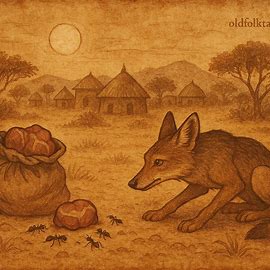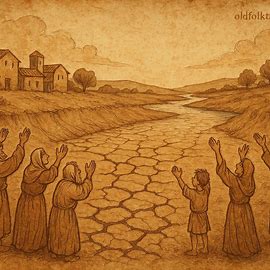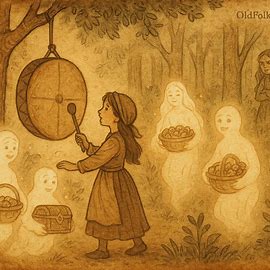In the dry, rolling lands of Sudan, where thorn bushes stretched across the earth and the sun burned fiercely overhead, there lived a jackal whose name carried both fear and admiration. Among the villages scattered across the plains, this jackal had become notorious for his endless raids on chicken coops. No matter how carefully the villagers guarded their fowl, no matter how tightly they sealed the wooden enclosures, the cunning creature always found a way.
He moved with the silence of drifting wind, his paws leaving barely a trace on the dusty ground. At night, when the moon rose pale above the huts, the jackal would creep along shadows, eyes glinting like embers. The moment the villagers closed their eyes in sleep, he struck, swift and precise, snatching a chicken in his jaws and disappearing before the dogs could bark.
The people grew weary of their constant losses. Chickens were not mere animals; they were livelihood, eggs for food, feathers for bedding, and trade in the marketplace. Each stolen bird meant hunger and hardship. Anger rose like heat among the villagers, and they swore that the jackal must be caught.
Traps were laid. Deep pits were dug and covered with branches. Snares were hidden beneath leaves. Bait was left to lure him in. Yet every time, the jackal outwitted them. He seemed to sense danger even before it arrived. When the villagers thought they had cornered him, he slipped away, leaving only mocking tracks in the dust. His name became a symbol of trickery, and the people shook their heads in frustration.
READ THIS: The Lioness and Her Children: A Sudanese Folktale That Teaches Lessons on Equality and Balance
But the villagers were not without patience. They gathered once more, elders and youths, and decided on a plan unlike the rest. This time they would not tempt him with ordinary bait. Instead, they filled a sack with fresh meat, its scent rich and irresistible. Hidden within the flesh, however, was poison, deadly and unseen. They placed the sack in an open space near the edge of the village, confident the jackal would not resist such an offering.
Night fell, and silence returned to the land. Out of the darkness came the jackal, his nose twitching, led by the powerful smell of meat. His eyes gleamed as he spotted the sack. At once, his hunger urged him forward. He licked his lips, for the prize before him seemed too great to ignore.
But the jackal, sharp of mind, was never quick to trust. He paused, ears alert, and whispered to himself, “Luck is never so easily won.” His long experience had taught him that when gifts appear too plentiful, danger often lies beneath. Still, he would not let the opportunity pass.
With care, he tore off a small piece of the meat and carried it far away, away from the sack and the trap, away from the eyes of men. He laid the morsel before the smallest creatures of the earth, the ants. Soon, they swarmed over the flesh, biting, cutting, tasting. Yet in moments their tiny bodies fell still. One by one, the ants perished, poisoned by what seemed so rich and good.
The jackal’s suspicions were confirmed. His eyes narrowed, and he turned his back on the sack of meat, leaving it untouched. That night he escaped death by wisdom, not speed. The villagers awoke to find their trap useless, their scheme defeated by the very cunning they had hoped to conquer.
The jackal returned to the wilderness, alive and unbroken, his cleverness once again proven stronger than the designs of men.
Moral Lesson
This Sudanese folktale carries a powerful lesson: appearances can deceive, and what seems like fortune may hide destruction. The jackal teaches us that true wisdom lies not in rushing toward every opportunity but in testing, questioning, and seeking proof. His caution saved his life, while recklessness would have been his end.
The story also reflects a broader truth of human life. In moments when rewards come too easily or too quickly, suspicion and patience protect us. Just as the jackal tested the poisoned meat, so must we test the choices we face in life. Wisdom often means pausing, even when hunger presses hardest.
Knowledge Check
Q1: Who is the main character of this Sudanese folktale?
The cunning jackal, known for stealing chickens from the villagers.
Q2: How did the villagers first try to catch the jackal?
They set traps, dug pits, and laid snares, but he always escaped.
Q3: What special trap did the villagers finally create?
They filled a sack with meat laced with deadly poison.
Q4: What did the jackal say when he found the sack of meat?
He said, “Luck is never so easily won.”
Q5: How did the jackal test the meat before eating?
He gave a small piece to ants, and when they died, he knew it was poisoned.
Q6: What is the main lesson of the story?
It teaches the importance of caution, testing appearances, and using wisdom before making choices.
Source: Sudanese folktale (collected among the Nuba people by Frobenius, 1923).






